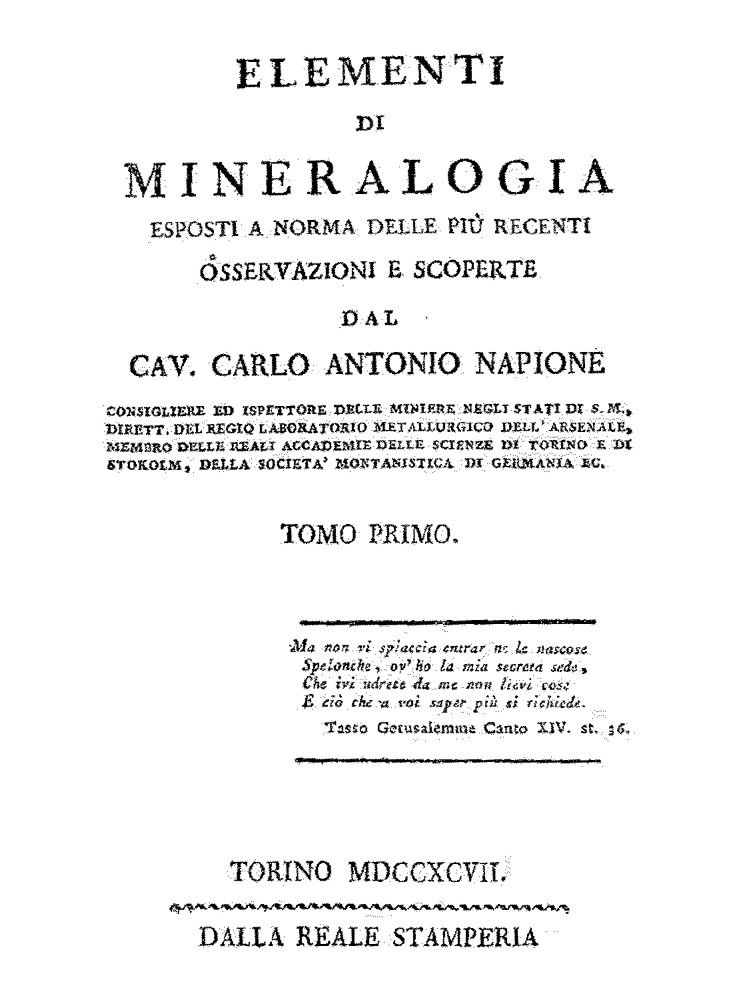NAPIONE, Carlo Antonio Galeani.
(1757 – 1814)
Napione as a military cadet studied mineralogy in Turin and thus began his lifelong interest in the subject. About 1780, he was sent to the Freiberg Bergakademie to study under Werner. Upon his return to Italy he entered the military service of his country and was stationed in Sardinia, where he became major inspector of the mines in the Sardinia states before becoming around 1795 director of the metallurgy laboratory at the School of Mineralogy in Turin. When Sardinia was annexed by Napoleon, Napione, who had reached the rank of colonel, emigrated and accepted a place on the military staff in Lisbon. Later, he became a Lieutenant General in the Portuguese colonial army. In 1807 he accompanied the prince regent to Brazil, and was appointed inspector-general of artillery and director of the arsenal, where he established a powder-factory and a cannon-foundry. Napione was elected a member of the Academy of Science at Turin.
Biographical references: Bulferetti, L., "I viaggi minerari di Carlo Antonio Napione `innovatore' nel Piemonte e nel Brasile", Rassegna Economica, 34, (1970), 7-31. • Burdet, C., "Il cav. Carlo Antonio Napione, Torinese (1756-1814)", Studi Piemontesi, 29, (2000), fasc. 2, 567-81. • Poggendorff: 2, col. 253. • Schiffner, Alter Freiberger Bergstudenten, 1935-40: 1, 8-9 & 2, 27. • Vaccari, Mineralogy and Mining in Italy, 1998.
1. Italian, 1795 [Biography].
Memoria sul Lincurio del Cav. Carlo Antonio Napione. Roma, presso A. Fulgone, 1795.
4°: [14] p. An anonymously published memorial to the life of Napione. Very scarce.
Bibliographical references: BL [981.h.18.]. • LKG: II 15.

2. Italian, 1797.
Elementi | Di | Mineralogia | Esposti A Norma Delle Più Recenti | Osservazioni E Scoperti | Dal | Cav. Carlo Antonio Napione | [...4 lines of titles and memberships...] | Tomo Primo. | [rule] | [...4 lines of quotation, signed Tasso Gerusalemme Canto...] | [rule] | Torino MDCCXCVII. | [wavy rule] | Dalla Reale Stamperia.
8°: xxii, 420 p., 3 foldedl.
Rare. Napione, a former student of Werner, was to spread his former teacher's mineralogical theories to Italy through his Elements of Mineralogy, which was one of the first textbooks on the subject written in the Italian language. Napione in his introduction explains that his aim in his book is to fill a gap caused by the lack of interest recently shown by Italian scholars for the study of mineralogy. He was referring to the great 16th century Italian works, but it is clear the author was attempting to reinvigorate the science of mineralogy in Italy. The text is written as an elementary treatise for the students of the School of Mineralogy in Turin, and it is based substantially on the theories of Werner. The work had been planned by Napione to be complete in three volumes, but the Napoleanic war caused the Elementi to remain the only volume printed in spite of the inclusion of "First Volume" on the title page.
Bibliographical references: BL [726.h.4.]. • Dana's 7th (Bibliography): 77. • LKG: XII 147. • Personal communication [Renato and Adriana Pagano].
3. Portuguese, 1817.
Tratado da mineralogia, corn referencia expressaos metaes uteis achados no Brazil. Rio Janeiro, 1817.
8°:
Extremely rare. Napione explored a great part of Brazil and the neighboring provinces prospecting for metal, and left interesting notes on the mineralogy and metallurgy he encountered. After his death, they were edited by order of the Brazilian government by Colonel Pinto, and published under the title Tratado da Mineralogia (Rio Janeiro, 1817). No copy of this title has been located.
Bibliographical references: Borba, Bibliographia Brasiliana, 1983.
.